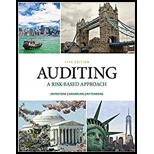
Bundle: Auditing: A Risk Based-approach, 11th + Mindtap Accounting, 1 Term (6 Months) Printed Access Card
11th Edition
ISBN: 9781337734455
Author: Karla M Johnstone-zehms, Audrey A. Gramling, Larry E. Rittenberg
Publisher: Cengage Learning
expand_more
expand_more
format_list_bulleted
Question
Chapter 1, Problem 27RQSC
a.
To determine
Concept Introduction:
AICPA’s Code of Professional Conduct −AICPA has issued a code of professional conduct which helps the auditors and AICPA members in the performance of their professional duties.
To explain:The given term.
b.
To determine
Concept Introduction:
AICPA’s Code of Professional Conduct − AICPA has issued a code of professional conduct which helps the auditors and AICPA members in the performance of their professional duties.
The reason why the external auditors cannot take contingent fees.
Expert Solution & Answer
Want to see the full answer?
Check out a sample textbook solution
Students have asked these similar questions
Accurate answer
general accounting question
Expert of Account Solve this asap
Chapter 1 Solutions
Bundle: Auditing: A Risk Based-approach, 11th + Mindtap Accounting, 1 Term (6 Months) Printed Access Card
Ch. 1 - Prob. 1CYBKCh. 1 - Prob. 2CYBKCh. 1 - Prob. 3CYBKCh. 1 - Prob. 4CYBKCh. 1 - Prob. 5CYBKCh. 1 - Prob. 6CYBKCh. 1 - Prob. 7CYBKCh. 1 - Prob. 8CYBKCh. 1 - Prob. 9CYBKCh. 1 - Prob. 10CYBK
Ch. 1 - Prob. 11CYBKCh. 1 - Prob. 12CYBKCh. 1 - Utilitarian theory holds that what is ethical is...Ch. 1 - Prob. 14CYBKCh. 1 - Which of the following statements related to...Ch. 1 - Utilitarianism does not require which of the...Ch. 1 - Prob. 17CYBKCh. 1 - Prob. 18CYBKCh. 1 - Prob. 19CYBKCh. 1 - Which of the following factors is not an example...Ch. 1 - Prob. 1RQSCCh. 1 - Prob. 2RQSCCh. 1 - Prob. 3RQSCCh. 1 - Prob. 4RQSCCh. 1 - Prob. 5RQSCCh. 1 - Prob. 6RQSCCh. 1 - Prob. 7RQSCCh. 1 - Prob. 8RQSCCh. 1 - Prob. 9RQSCCh. 1 - Prob. 10RQSCCh. 1 - Prob. 11RQSCCh. 1 - Prob. 12RQSCCh. 1 - Prob. 13RQSCCh. 1 - Prob. 14RQSCCh. 1 - Prob. 15RQSCCh. 1 - Prob. 16RQSCCh. 1 - Prob. 17RQSCCh. 1 - Prob. 18RQSCCh. 1 - Prob. 19RQSCCh. 1 - Prob. 20RQSCCh. 1 - Prob. 21RQSCCh. 1 - Prob. 22RQSCCh. 1 - Prob. 23RQSCCh. 1 - Prob. 24RQSCCh. 1 - Prob. 25RQSCCh. 1 - Prob. 26RQSCCh. 1 - Prob. 27RQSCCh. 1 - Prob. 28RQSCCh. 1 - Prob. 29RQSCCh. 1 - Prob. 30RQSCCh. 1 - Prob. 31RQSCCh. 1 - Refer to the Why It Matters feature “What Is...Ch. 1 - Prob. 33RQSCCh. 1 - Prob. 34RQSCCh. 1 - Prob. 35RQSCCh. 1 - Prob. 36RQSCCh. 1 - Prob. 37RQSCCh. 1 - As the auditor for XYZ Company, you discover that...Ch. 1 - Prob. 39RQSCCh. 1 - Prob. 40RQSCCh. 1 - Prob. 41RQSCCh. 1 - Prob. 42RQSCCh. 1 - Prob. 43FFCh. 1 - Prob. 44FFCh. 1 - Prob. 45FFCh. 1 - Prob. 46FF
Knowledge Booster
Similar questions
- For Ikea Manufacturing, the predetermined overhead rate is 125% of direct labor cost. During the month, Ikea incurred $96,000 in total factory labor costs, of which $78,400 is direct labor and $17,600 is indirect labor. The actual manufacturing overhead incurred was $100,500. Compute the amount of manufacturing overhead applied during the month. Determine the amount of under- or overapplied manufacturing overhead.arrow_forwardProvide Solution?arrow_forwardSolve this questions Financial accountingarrow_forward
- General Account tutor please find solutionarrow_forwardprovide solution plzarrow_forwardLavigne Solutions allocates manufacturing overhead based on machine hours. Each unit is expected to require 10 machine hours. According to the static budget, Lavigne expects to incur the following: 1. 600 machine hours per month (units × 10 machine hours per unit) 2. $7,800 in variable manufacturing overhead costs 3. $11,200 in fixed manufacturing overhead costs - During September, Lavigne actually used 520 machine hours to make 52 units and spent $7,200 on variable manufacturing costs and $11,000 on fixed manufacturing overhead costs. What is Lavigne’s standard variable manufacturing overhead allocation rate? Need answerarrow_forward
arrow_back_ios
SEE MORE QUESTIONS
arrow_forward_ios
Recommended textbooks for you
 Auditing: A Risk Based-Approach (MindTap Course L...AccountingISBN:9781337619455Author:Karla M Johnstone, Audrey A. Gramling, Larry E. RittenbergPublisher:Cengage Learning
Auditing: A Risk Based-Approach (MindTap Course L...AccountingISBN:9781337619455Author:Karla M Johnstone, Audrey A. Gramling, Larry E. RittenbergPublisher:Cengage Learning Auditing: A Risk Based-Approach to Conducting a Q...AccountingISBN:9781305080577Author:Karla M Johnstone, Audrey A. Gramling, Larry E. RittenbergPublisher:South-Western College Pub
Auditing: A Risk Based-Approach to Conducting a Q...AccountingISBN:9781305080577Author:Karla M Johnstone, Audrey A. Gramling, Larry E. RittenbergPublisher:South-Western College Pub College Accounting (Book Only): A Career ApproachAccountingISBN:9781337280570Author:Scott, Cathy J.Publisher:South-Western College PubBusiness/Professional Ethics Directors/Executives...AccountingISBN:9781337485913Author:BROOKSPublisher:Cengage
College Accounting (Book Only): A Career ApproachAccountingISBN:9781337280570Author:Scott, Cathy J.Publisher:South-Western College PubBusiness/Professional Ethics Directors/Executives...AccountingISBN:9781337485913Author:BROOKSPublisher:Cengage

Auditing: A Risk Based-Approach (MindTap Course L...
Accounting
ISBN:9781337619455
Author:Karla M Johnstone, Audrey A. Gramling, Larry E. Rittenberg
Publisher:Cengage Learning

Auditing: A Risk Based-Approach to Conducting a Q...
Accounting
ISBN:9781305080577
Author:Karla M Johnstone, Audrey A. Gramling, Larry E. Rittenberg
Publisher:South-Western College Pub



College Accounting (Book Only): A Career Approach
Accounting
ISBN:9781337280570
Author:Scott, Cathy J.
Publisher:South-Western College Pub

Business/Professional Ethics Directors/Executives...
Accounting
ISBN:9781337485913
Author:BROOKS
Publisher:Cengage